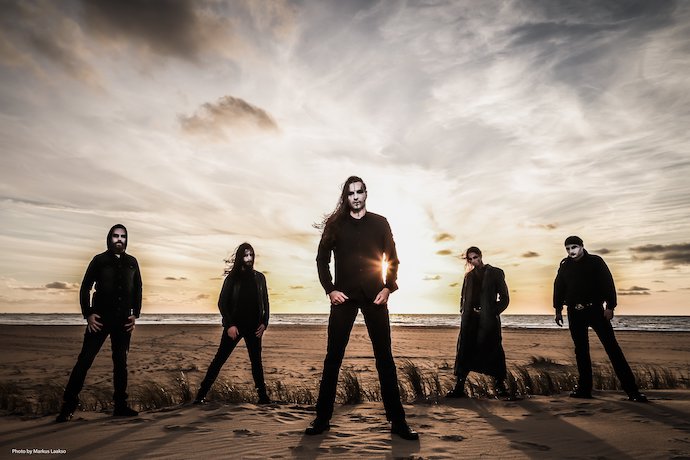
(Yesterday we presented Part One of an extensive interview Karina Noctum conducted with Morean of Dark Fortress, and today we present the conclusion, again with our thanks to Morean for devoting so much time to the discussion.)
This is the second part of the in-depth interview with Morean from Dark Fortress. While the first part was about composition and creation of music, among other topics, this part is solely devoted to the lyrical themes of Spectres from the Old World, the band’s latest album, which was released back in February of this year.
Since I am Infinite Space, and the Infinite Stars thereof, do ye also thus. Bind nothing! Let there be no difference made among you between any one thing & any other thing; for thereby there cometh hurt.
Aleister Crowley, The Book of Law
How do the lyrics differ from, or are similar to, those of previous releases?
This time, my main inspiration was the unbelievable beauty of the natural world, in all its wonderful structure and sometimes with all its cruel implications of how irrelevant we are in it. In this, I found myself fascinated by current ideas of cosmology, and I started wondering: If the universe had a voice to comment on what happens in it, what would it say? So I planted the protagonist from the previous album, who at the end of it had been transformed into a creature of pure light, into the hypothetical 11 dimensions proposed by string theory, and made him experience the lifespan of a universe, from the big bang and the creation of everything we know to the very end of existence when the last black hole has evaporated and the cosmos has reached thermodynamic equilibrium. He basically becomes the sentient fabric of the universe — locked out of time and space as we know them, but still able to observe and manipulate in ways undetectable by anything that lives inside that universe.
Dying universes are nothing new of course, as far as my lyrics are concerned. But contrary to previous albums like Venereal Dawn or Eidolon, which were set in fictional worlds, this time around it was the magic of our physical universe which fueled my inspiration. I traveled to various ends of the earth in recent years, to areas with almost no inhabitants — think of Patagonia, Greenland, Svalbard, Antarctica, or the Icelandic Highlands; areas where you feel as if you’re standing on a virginal planet, watching how the primordial forces of fire and ice create the world we know. It’s an awe-inspiring experience every time, which is in such stark contrast to the very tamed civilized world I inhabit in daily life in the Netherlands that I often felt as if I was standing in an LSD trip that had manifested itself in stone, glaciers and vegetation. Some of the places you find there make even Middle Earth look like a boring backyard.
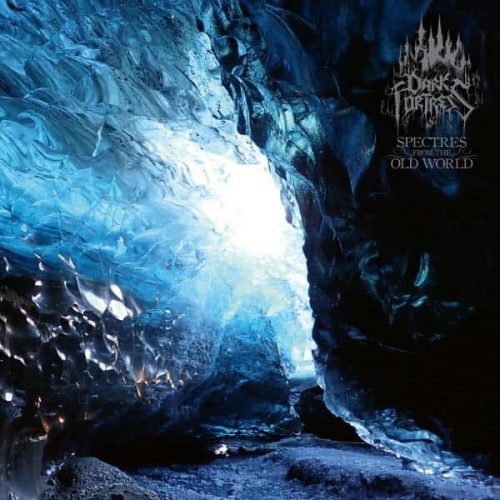
Is there a message that you want to convey in the lyrics?
There is no “message” per se. I hate when someone tries to force their opinion down my throat in their art. I try to offer the listeners access to my inner worlds with my lyrics, but what they make of my visions and imagery is always up to them. This is how I have always listened to music as well, and I hope, even if someone isn’t too interested in what I’m describing, that the words themselves are powerful enough to trigger the right associations in their mind, even if what they see in their head is something totally different than what I saw.
But if you ask me what it’s all about on this album, it’s the mind-blowing fact that, at least according to what we know today, a simple set of physical laws of thermodynamics, gravity and basic chemistry set a mechanism in motion that transformed a hot dense primordial particle soup into the stars, planets and galaxies that now constitute our unimaginably vast cosmos in all its diversity, beauty and brutality. The place that we humans occupy in it is no more than a fleeting presence which is utterly irrelevant in the big picture, no matter how much we inflate our self-importance and no matter how many lies about creation, messiahs and deities we hide ourselves behind to conceal the fact that on a universal scale, we are absolutely nothing. The field of tension between those two extremes forms the backdrop for the songs on this album.
In Venereal Dawn you made use of lots of pretty exotic languages. Did you do the same for this new album?
On the new album, it’s just Latin in the last track, if you don’t count the quoted physics formulas in the intro and interlude as a weird language, or the name Pali Aike, which means “Home of the Devils” in the native Fuegian Aónikenk language.
On Venereal Dawn I went further. I’ve written lyrics to quite a bunch of metal albums now, and I try to make an effort to not say the same stuff with the same words over and over again — not only content-wise, but also sound-wise. So on VD, besides English, I used Romanian, Spanish, Nahuatl, Latin and Arabic as well. Mainly because I love how they sound, and the fresh flavor they give to the respective songs, and in the case of Nahuatl because the VD album concept started during a trip through Mexico, and I didn’t mind including something from all their vast cultural heritage, which in Europe we tend to know nothing about.
There were a bunch of songs from the VD sessions that didn’t end up on the album, one of which even had a spoken middle part in my native Bavarian tongue. I really liked how that turned out; unfortunately there was no space on the album anymore for that song, which was also more than ten minutes long. We didn’t want to end up having to sacrifice a better track for that one.
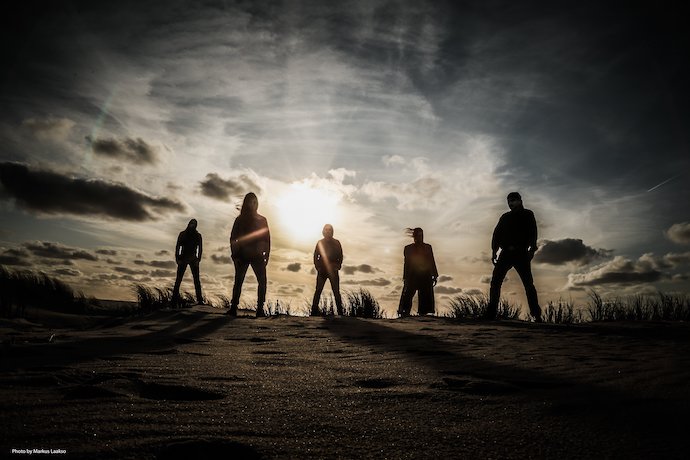
Many songs on the album are situated in the cosmos, but some others change perspective and go back to the earthly, the human, and the primitive. Why did you decide to make such a contrast?
Excellent question. I guess because the music is emotional, and it’s easier to connect to our far-flung visions if there’s a human perspective as well. In the light of the scale of everything here, it means of course that the only thing humans add to the story is being a temporary nuisance in the cosmos, and the “I” / “we” perspective here is actually the cosmos itself, observing and commenting on the emergence and demise of this tiny cocky species. This angle does fit very naturally to black metal.
Many themes in the album, especially those revolving around human arrogance and its consequent annihilation, are pretty current. The perspectives taken are rather misanthropic and pretty Black Metal. It’s scary to think that we may be heading toward a catastrophic scenario. Can you tell us more about your approach to this contemporary horror?
I had a funny thought about that this week, with our world in the grip of this pandemic that makes you think we somehow ended up on a bad Sodom album from the ’80s or something. Life imitating art… So, all of a sudden, metal, and all its morbidity-loving escapist protagonists like me, might have to look for new subjects to growl about when reality has become actually even more apocalyptic than what you thought was evil enough in your lyrics. I guess after this madness is over, everything will have to change. That in itself is maybe not a bad thing.
I recently read the question “Is this the catastrophe we’ve been yearning for?” Made me laugh. I mean, nobody except the seriously deranged actually hopes for a disaster. But every challenge also offers new chances, and maybe this can be a good wake-up call for our species to re-evaluate what we are, what we want to be, and how we deal with each other, and with life on this planet. But there will never be a shortage of misery I guess, so I don’t worry for the future of our art.
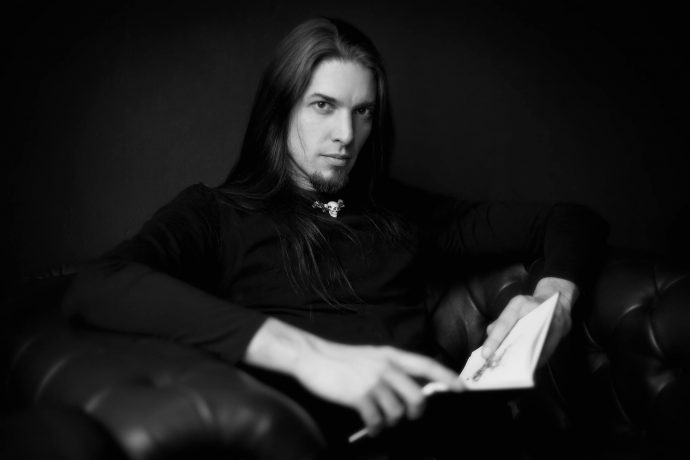
What particular mood do you need to get into when you write your lyrics? I guess it is not difficult to find inspiration when it comes to human fatal mistakes and shortcomings…
Yes, there’s always plenty of that. And to be honest, as much as everyone else’s idiocy, it’s also my own stupidity and shortcomings as a domesticating primate which disgusts me from a bird’s-eye perspective. But since this is our default state anyway, it’s hardly a primary source of inspiration. That would be the fascination with space and earth sciences in this case, and my compulsive need to take every idea to its extreme immediately in my mind. Due to my choice to try and incorporate humans into this abstract stuff, there’s little else I could think of that I could have said about us as a species, even though in reality there’s enough light balancing out the shadow.
I was never too interested in the usual human-centered subjects like love, politics, depression, violence etc; others do that better. I always want to go to the most far-out place I can reach, even if it’s just in my mind. And then I end up with a convoluted idea like letting the universe talk about what goes on inside of it, and you guys have to make sense of it. I’m not apologizing though, hehe!
In Spectres from the Old World you write from the perspective of a being that appeared in Venereal Dawn and that reincarnates on another plane of existence in the new album. Tell us more about this particular entity and his journey in the new album.
Venereal Dawn was about facing a mortal enemy — in this case, a poisonous sun — against whom humans don’t stand a chance. The question then was: what does that do to a person? How much of what you think is your “self” can you lose and have stripped away before you stop being “you”? This is a profound question. Much of what we consider to be essential and unchangeable characteristics of ourselves is actually just encrusted conditioning, which can very well be shaken loose and gotten rid of with a bit of psychic effort. There’s nothing special at all about this protagonist, it could literally be any person out there, and the use of different languages helps to create the feeling that this could be any of us.
On the new album, I take it one step further. The narrator, who has been transformed to a being of pure light, reincarnates into a new universe, as part of the fabric of space-time itself, hidden away in invisible dimensions as proposed in String Theory. So after having had his bodily existence taken away from him on the previous album, he has now even lost the universe itself, and ends up in a “place” where literally nothing is familiar, and where he’s even more powerless to interact with anything. So all that remains is a vague echo, a mere memory of an existence long lost, as he hangs suspended outside of time and space, watching the life of a universe simultaneously from the outside, and from its innermost core. He is a spectre, a mere ghost from a long-gone old world — hence the title of the album. It’s not a set-up to tell the story of becoming some kind of god-like being; it’s a story of being as miserable and fucked up as always, but then in eleven dimensions. And for me, this takes absolutely nothing away from the beauty of this universe apparatus itself.
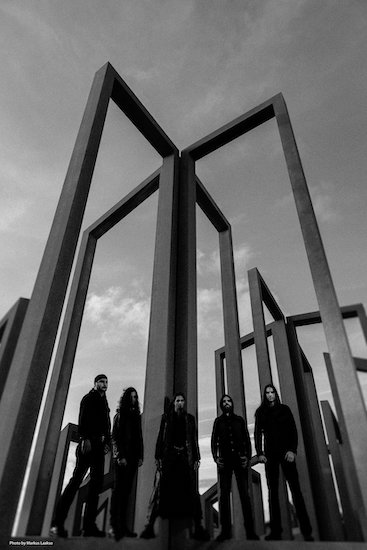
Why did you choose this narrative device, the special being, in the lyrics? What was challenging when you wrote from such a complex being’s perspective?
My mind doesn’t need much stimulation to go off on a tangent, as I’m sure you’re well aware of by now. I love “what if”s, and when I read about for example a proposed mechanism to extract energy from black holes when all stars in the universe have gone aeons ago, I immediately see it as a vivid real scene in my head, like an instant movie. I immerse myself in such a thought until it becomes almost a tangible world around me, even if it started from only the tiniest of electric flashes in my brain. I’ve always had an overactive imagination, and having worked as a composer for so many years, where you spend all your time perceiving worlds that don’t exist yet, makes it really easy now for me to completely lose myself in these visions.
Luckily, I have an outlet for it with my music and lyrics that can also give something to other people; it’s hard to think I’d last even an afternoon if I had to do the actual science, because I suck at it. So the entity here is not necessarily complex; it’s the world it finds itself in which is crazy and complex. And the challenge is to find words to express that in any kind of understandable way.
Many of you may recognize this from meditation, astral travels, or the many other kinds of mental travel: what you see in your mind can be completely clear to you, like the fresh memory of an intense dream. But as soon as you try to tell someone about it or put it into words, it crumbles into nothingness. So that’s the big challenge here: not having the vision itself; that happens automatically, and i couldn’t even stop it if I tried. It’s translating it to the limited tools of our perception and communication that takes more time than anything else.
With music it’s the same by the way: for example, you may hear something that goes “uoooh uoooh UOOOOHH…. BLAMMMMM!!!!” in your head, a thought that takes half a second to have. Working that out into notes that people can play on their instruments, so that when they do, it sounds like what you felt when you had this idea, that’s the real killer, and requires a lifetime of dedication and hard work to even get close to it if you don’t want to just say what everyone else has already said a million times before. That’s why innovation takes so much time.
I have myself given it a try to understand physics from a philosophical view that makes it easier to my understanding. It is demanding for the intellect, I concede. Your lyrics deal with pretty complicated concepts. How difficult was it to prepare to get the narrative right? How do you approach physics being an artist and not a scientist?
In the past, I tried to just read as much as I could about the chosen subject, sometimes for months. Of course my understanding is very limited, but there’s a point when at least in my mind it starts making sense. The problem, if you don’t want to use scientific concepts in totally the wrong way, like it happens in so much fiction, is being able to tell when your limited understanding becomes utter bullshit that would make actual scientists laugh and nothing else.
But this time, I was fortunate to get to know a young quantum physicist who happens to be a fan of my bands. I met him on Metal Days in Slovenia, and it was the first time I talked to someone who understands both the art and the science equally well. He helped me really a lot with the physics, with the proper pronunciation of those formulas, and checking which aspects of my story would still be in line with scientific understanding.
I write this stuff out of pure love and fascination for the subjects I choose, and if something turns out to be totally misunderstood by me, I can live with that. I’m happy to learn. But I don’t want to take obvious falsehoods as departure point for a lyric or story, so having someone with actual knowledge of these things looking over my shoulder really helped me a lot here.
The lyrics have to fit the music. I have seen lyrics that just have basic “evil” words that rhyme and that’s it. Pretty simple chorus lines which is fine as long as the music is good. But you care a lot for how words fit the whole, so how did you make scientific concepts harmonize with the music? Was it difficult to find the right words or literary devices?
You bet! Besides the content, of course the form can be another very time-consuming aspect of writing vocals and lyrics. As far as that is concerned, I approach it like music: rhythms, sounds, pitches, different registers of expressions. When I get the track as an instrumental demo from Santura, I compose the vocals like that first, usually with a ridiculous dummy lyric. At the same time, I collect ideas of what to say, and as many words and synonyms as I can to express it. English is great for that, since it has a much larger vocabulary than other languages due to its twin sources of both Germanic and Romanic words. It also allows you to say a lot with very few syllables, and also allows you to be creative with it, so you can easily make up words that make sense if there’s no word for something you wanna say.
The rest of the work — and this is what takes the longest usually — is the Tetris game of bringing the two together. For example, if you commit to a certain rhythmical pattern or rhyme scheme, you force yourself to stick with it. If a song has three choruses, and the sheer amount of narrative you want to put into a limited amount of lines, and thus forces you to give every chorus a slightly different text, you still have to make sure the chorus works as a recognizable hook every time it comes, like for example in “Pulling at Threads” on this album.
It’s a bit like solving crossword puzzles. But honestly, since I write so much music all the time, this work when I write the lyrics by now is what I enjoy most about the whole process. I can do it with just my computer and a bunch of dictionaries and wikipedia, and I spend countless nights like that. Of course, I could also just go “metal blood Satan evil” and be done with it in fifteen minutes. But where’s the fun in that?
The song “Isa” is an ode to ice and stands out as positive while compared to the rest of the album, and it’s also directly related to the artwork. Why did you choose this concept out of the rest for the artwork?
It was a decision by vote in the band. I offered a ton of our photos for the artwork, and choosing which ones we want to use took some time. For me, out of those, any could have been the cover, and Santura for example actually favored another picture than the one we agreed upon. But the rest of the band wanted this one, and you don’t hear me complaining. Since “Isa” is the most monolithic of the new songs, and I guess my personal favorite on the album, it seemed acceptable to make this ice cave photo also the album cover. And the way the light shines through the glacier looks a bit like a discarnated ghost of light anyway, so I think it was a good choice.
So the album deals with different concepts, what’s the thread, the overall concept?
I guess the question: If the universe had a voice, what would it say? Impossible to answer properly of course, but then again, so is the question of life after death, and that hasn’t stopped anyone from pouring their wild fantasies about it over everyone as “truth”, like many religions do. A less obvious aspect of this story is the realization that the evil on the last album, the poisonous sunlight which perverted and destroyed life on earth before transmogrifying it into light, was actually not necessarily evil in itself, as something from the outside, but could only flourish because of the evil in ourselves which allowed humanity to be perverted. In the new cosmos on Spectres…, we get to watch humans appear from our timeless perspective, and the universe realizes that the perversion and corruption was predestined by human nature. Hardly a new insight, I know, but true nevertheless.
Does the being in the first two songs continue in the earthly songs? Does he weave himself in nature, ice being made of the same particles as the universe? Is his perspective what inspired the deep misanthropic views?
Yes, his perspective continues in the background, even though for example in “Isa”, it’s the ice itself which speaks, and not the universal observer. But indeed, the “I” / “we” from the first few songs gives way to a less personal, more detached neutral perspective as humans are left to create their mess, and pathetically fade away in complete denial of their own irrelevance at the end. The outro, “Nox Irae”, is more of a sarcastic perversion of a final rite, as if the universe had watched us come and go and goes tsk tsk tsk, before forgetting we ever existed. There is no hero here, no catharsis, no deus ex machina to save what can’t be saved – just consequence, and the cold axe of the laws of physics.
https://www.facebook.com/FlorianMagnusMaierMoreanOfficial/

No comments? Well, let me just say I’m no big fan of black metal these days, I was in the 90’s but dropped out of the extreme metal game in 97-98 when I felt it all just nazi-stuff/gay killings/ church burnings. I mean, I just really digged the music, i side with some philosophies, but all that… no thanks. Morean truly has his head on his shoulders and know his shit though. I got back into the metal game for sure in 2017 and I also quickly found my way to Alkaloid, who are absolutely amazing. I could tell right away that the vocalist/ lyrics writer (and the other guys) are not your run of the mill metal heads – they are, but even more than that. And the lyrics on Alkaloid albums (and vocals) are astounding, greater than any metal music lyrics before or current. The David Tibet of metal, with an incredible grasp of sci-fi history/ sci-fi horror. Dylan spheres? Phuck yeah.
And listening to the latest Dark Fortress, while way more death and prog than you’d ask of black metal, certainly makes a strong case for me not to abandon that music altogether.
Incredibly insightful interview. Thank you for this one Karina Noctum, and Morean of course!